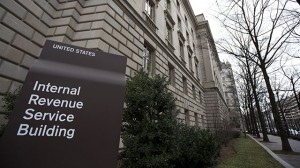
The Internal Revenue Service building at the Federal Triangle complex in Washington, Saturday, March 2, 2013. (AP Photo/Manuel Balce Ceneta)
The IRS is considering new rules that would clarify what political activities 501(c)4 “social welfare” organization can participate in. Unlike traditional political action committees (PACs), c4 organizations aren’t required to disclose their donors. As a result, these organizations have become increasingly popular among wealthy donors who want to keep their influence out of public view. According to the Center for Responsive Politics, these groups spent about $300 million during the 2012 election, about 85 percent of it on the conservative side.
Social welfare organizations are allowed to influence elections to a degree, but can’t make electoral politics their “primary focus.” The problem is that standard hasn’t been well defined.
That lack of clarity was at the heart of the IRS’s Cincinnati field office using “inappropriate criteria” to examine these groups’ applications for tax-exempt status. In its report on the “scandal,” the IRS Inspector General’s office wrote, “We also believe that Determinations Unit specialists lacked knowledge of what activities are allowed by” the tax code.
Richard Rubin reported this week for Bloomberg that the rules under consideration “would give some of the biggest players from the 2012 campaign, including Crossroads Grassroots Policy Strategies, greater certainty to run ads in ways that don’t risk their tax-exempt status going forward.”
They could run issue-based ads that mention candidates’ names months before an election, and then switch to a direct pitch closer to the vote.
“If I were sitting in the chair of a conservative political operative, I would be rubbing my palms together hoping that these (c)(4) rules would be adopted,” said Greg Colvin, an attorney at Adler & Colvin in San Francisco who specializes in the political activity of nonprofit groups.
But while deep-pocketed dark money groups on the right should be happy with the proposed rules, that isn’t the case. Rubin writes that the “prospect of benefits for big-money political nonprofit groups — which are mostly Republican-leaning — runs counter to the message from Republican lawmakers, who call the IRS rules a political maneuver by the Obama administration to restrict groups favoring smaller government.”
That’s because despite the fact that the Inspector General found that the extra scrutiny given to 501(c)4s was a result of incompetence rather than politics — and that there was no outside pressure from Washington on the field agents — it’s become an article of faith among conservatives that the IRS tried to suppress groups opposed to Obama’s re-election. Wall Street Journal columnist James Taranto went so far as to suggest that it swung the election in Obama’s favor — he called Obama “President Asterisk.” And that narrative survived even after the AP obtained internal IRS documents showing that “terms including ‘Israel,’ ‘Progressive’ and ‘Occupy’ were used by agency workers to help pick groups for closer examination” — in other words, that conservative groups weren’t the only ones targeted for extra scrutiny.
Nonetheless, reports Rubin, “the IRS has received more than 38,000 comments on the rules, most in opposition. Some commenters have accused the tax agency of shredding the Constitution and others compared the limits to speech restrictions in China.” (Update: There are now over 64,500 comments.)
You can add your own voice to the mix with a comment here. In December, Sheila Krumholtz, director of the Center for Responsive Politics, told BillMoyers.com, “At a minimum, their stated goal is to achieve clearer guidelines about political activity by nonprofits. That is plainly necessary.”
While that’s true, this may be a case of fighting the last war. As Justices O’Connor and Stevens wrote in a landmark campaign finance case, “money, like water, will always find an outlet.” And it’s possible that the next outlet will be 501(c)6 organizations — ostensibly trade groups like the Chamber of Commerce. Last September, almost a year after the 2012 election had drawn to a close, Politico revealed that a massive and previously unknown pile of dark money had been spent by the Koch brothers-linked Freedom Partners, which had been organized as a c6.


